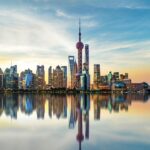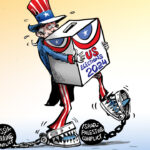The audit on Volkswagen’s jointly owned plant in Xinjiang was carried by Loening Human Rights & Responsible Business GmbH, among the site’s 197 employees in SAIC-Volkswagen (Xinjiang) Automotive Co.
The audit encompassed on-site document checks in Urumqi city as well as interviews with staff and executives of the legal entity in Xinjiang. Several on-site inspections, including walkabouts of the outdoor premises of the plant were also part of the auditing process.
As of November 1, 2023, the legal entity had 197 employees, of which 150 employees are of Han ethnicity, accounting for 76.1 percent, and 23.9 percent of employees are ethnic minorities including Uygurs.
Loening said that the employees are qualified, having worked for the company for a long time of up to 10 years, have a low work intensity and are being remunerated above the average in the region. Overtime work is next to non-existent.
There were no indications of any use of forced labor among the employees at the plant, it said.
The result serves as a strong rebuttal to certain Western countries’ smear campaign hyping the claims of “forced labor” in Xinjiang, as the audit process was conducted independently, in accordance with US and European standard and in line with the truth, a professor specializing in human rights issues at Southwest University of Political Science and Law, who requested anonymity, told the Global Times.
Earlier this year, Volkswagen investors demanded that the carmaker request cooperation from SAIC to conduct an independent audit of labor conditions at the site in Xinjiang, Reuters reported. Volkswagen’s China chief Ralf Brandstaetter said there was no evidence of human rights violations or forced labor when he toured the site in February.
Big German companies, such as Volkswagen, have become targets of blame by some forces in Europe over human rights issues in China, because Germany has the closest trade cooperation with China within the EU, said Cui Hongjian, a professor with the Academy of Regional and Global Governance with Beijing Foreign Studies University. He said that those forces intend to use big corporations to pressure Germany and they believe once Germany changes its stance on China, it would help form a tougher stance against China within the EU.
Cui noted that the Volkswagen case has proved that the tendency in EU using political issues to poison cooperation has repulsed the European business circle. Big European companies now find the judicial and legal environment they thrived on has been eroded by certain China hawks in the EU, noting that cases such as forcing companies to prove their innocence will be repeated as long as some in Europe still see China as a threat.
In September 2022, the European Parliament proposed a regulation to ban products made using forced labor, including child labor, in the European Union (EU) internal market. However, the regulation has stalled, as member states struggle to agree on a common position that would allow inter-institutional negotiations to begin.
Part of the rationale behind Europe’s “forced labor” move is to push for supply chain reconstruction, which might run against market rules as well as companies’ interests, said Yan Shaohua, a research associate professor at the Center for China-Europe Relations, Fudan University. He noted that Volkswagen’s example mirrors a tussle between business and political circles in Europe and helps to clear some misperceptions toward Xinjiang in Europe.
Dispel misunderstanding
“Forced labor” topic has been frequently abused by Western countries, especially the US, to pressure foreign companies who do business with China and Chinese companies. Similar to Volkswagen, US shoe company Skechers had a batch of its products manufactured in China seized by US customs, citing the so-called Uyghur Forced Labor Prevention Act, the Global Times learned from sources in 2022.
In order to meet the demand of the US customs, Skechers organized an independent investigation conducted by a third party, which found no evidence to support the “forced labor” allegations.
In September, US Department of Homeland Security said in a statement that it added three Chinese companies – Xinjiang Tianmian Foundation Textile Co Ltd, Xinjiang Tianshan Wool Textile Co. Ltd, and Xinjiang Zhongtai Group Co. Ltd – to the Uyghur Forced Labor Prevention Act (UFLPA) Entity List for their business practices involving “persecuted” minorities in Xinjiang, media reported.
In response, Chinese Foreign Ministry spokesperson Wang Wenbin said that China has made clear time and again that the allegations of “forced labor” in Xinjiang are nothing but an enormous lie propagated by people against China to smear our country’s image.
Washington is determined to spin “forced labor” lie in order to strip China from the global supply chain, as Xinjiang remains a relatively small market for the US. However, Xinjiang’s market is much more important for Europe, thus if Europe follows the US to weaponize “forced labor” claims, European companies and its economy will feel the pinch, Cui said.
In 2021, Xinjiang recorded around 261.8 billion yuan ($41 billion) in foreign trade with EU countries in the first 11 months of the year, up 30 percent year-on-year.
As agreed between China and the EU, the 24th China-EU Summit will be held in Beijing on Thursday, Foreign Ministry spokesperson Hua Chunying announced on Monday.
Wang Yiwei, director of the Institute of International Affairs at the Renmin University of China said that as usual, human rights issue will be discussed between the two sides. “The Volkswagen case has proved that the reckless smearing of China and politicians’ thwarting of China-Europe cooperation out of ideological prejudice has provoked antipathy among Europe’s business communities, while the public is eager to get a more rational and objective picture of China.”




